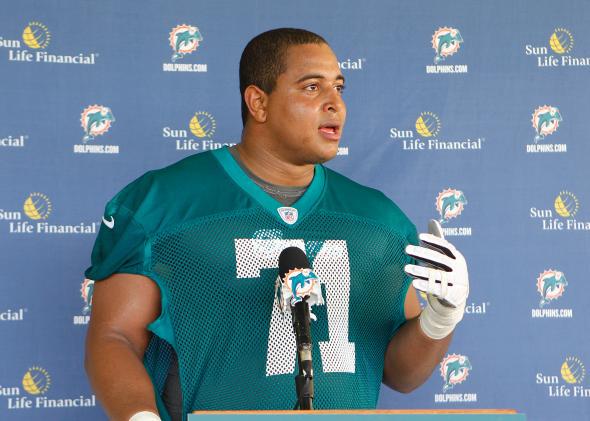Does the United States have a culture of bullying? That was the thesis of an article by the New Republic’s Chris Wallace that came out Tuesday. Following in the footsteps of Dave Zirin, who argued last week in the Nation that the NFL’s pernicious “man code” reflected a broader American weakness for “sexism, violence against women…and physical domination of others,” Wallace examines how the “power politics of the locker room” unfold across the country. “There exists a rush to dominance, a pattern of bullying,” he writes, “in every walk of life…The hardest part about watching a football game for me now (aside from knowing now the real toll of the carnage-as-entertainment) is seeing its reflection in the world that brackets it.”
Wallace was reacting to the high-profile NFL fiasco in which a white player for the Miami Dolphins, Richie Incognito, bullied a black teammate, Jonathan Martin, to the point of hospitalization. When Martin first reported the abuse, he was widely dismissed and insulted for tattling like a kid. What he’d done by going to the authorities—instead of taking his tormentor “to fist city”—was break the masculinity code. He failed to “step up and be a man,” according to Tennessee running back Chris Johnson. “I think Jonathan Martin is a weak person,” added an NFL personnel worker (who bravely insisted on anonymity). “There’s no other way to put it, other than him being soft.”
Be a man. Soft. Weak. Got that? As my colleague Amanda Marcotte wrote, “As long as we imagine that there is ‘masculinity’ and ‘femininity’ and these things are in opposition, then men are going to be under relentless pressure at all points in time to prove that they’re not somehow turning into women.”
The same day Wallace published his cri de coeur, another corner of the Internet flared up with its own bullying narrative. A law professor named Nancy Leong published the first of four posts on web harassment. “I want to look closely at…the way that Internet harassers focus on identity rather than on ideas as a specific strategy for excluding women and people of color from online discourse,” she wrote. At which point anyone with any kind of acquaintance with “online discourse” knew to get ready for some repugnant examples. Leong chose hers from personal experience.
“This over-employed pillar of mediocrity is an attractive young woman? Shocking, I wonder how this situation might have developed,” wrote one commenter on an article Leong had written.
“She love someone leong time to get herself a law professor position at such a young age,” quipped someone else. (Clever!)
Leong explains that these cracks exemplify a specific strategy cyber-bullies use to shut down minorities. Instead of engaging with the ideas presented, trolls zero in on the presenters. They hijack the conversation by fixating on the target’s lower status. Basically, they respond to notions they don’t like by telling authors: You’re just a [fill in the blank]. You’re qualified to [do whatever probably-degrading things are stereotypically associated with the type of blank you are], but not have opinions.
Some of this deplorable identity-politicking also occurred in the NFL bullying scandal. Incognito allegedly harped on Martin’s race in a series of nasty texts and voicemails. But what’s striking to me, looking at Martin and Leong side by side, are not the similarities between these cases but the differences.
Martin was bullied when the pro-football world told him he was not a man. Leong was bullied when commenters reminded her that she was a woman—specifically, only a woman, a sex object. The relevant words are NOT versus ONLY—Martin was NOT dominant, strong or tough enough, while Leong was reduced to ONLY a “pretty piece of ass” her colleagues could “undress with their eyes.” Martin was forced out of the prestigious box his gender would otherwise enable him to occupy, while Leong was chided, basically, to crawl back into her inferior box.
Does this mean that bullying is inherently sexist, for the way it traffics in a worldview that exalts the masculine and denigrates the feminine? Not necessarily: Leong’s harassment took place online, at the hands of strangers, while Martin was hounded both technologically and IRL by people he knew—the situations aren’t quite comparable. (Plus, women don’t usually torture each other by invoking the idea that femininity is second-class—although they sure will slut-shame.) And I’m not trying to argue that one sex has it worse than the other. Being denuded of power and being admonished that you never had it to begin with probably suck equally.
Yet do these two case studies niftily show the hold sexism continues to have over our culture? Do they cast a light on the different, but often equally shitty, ways it touches men and women’s lives? Yup. Whether or not bullying is intrinsically sexist, it sure can perpetuate dismal gender stereotypes, in addition to all its other lovely qualities.
Yet do these two case studies niftily show the hold sexism continues to have over our culture? Do they cast a light on the different, but often equally shitty, ways it touches men and women’s lives? Yup. Whether or not bullying is intrinsically sexist, it sure can perpetuate dismal gender stereotypes, in addition to all its other lovely qualities.
